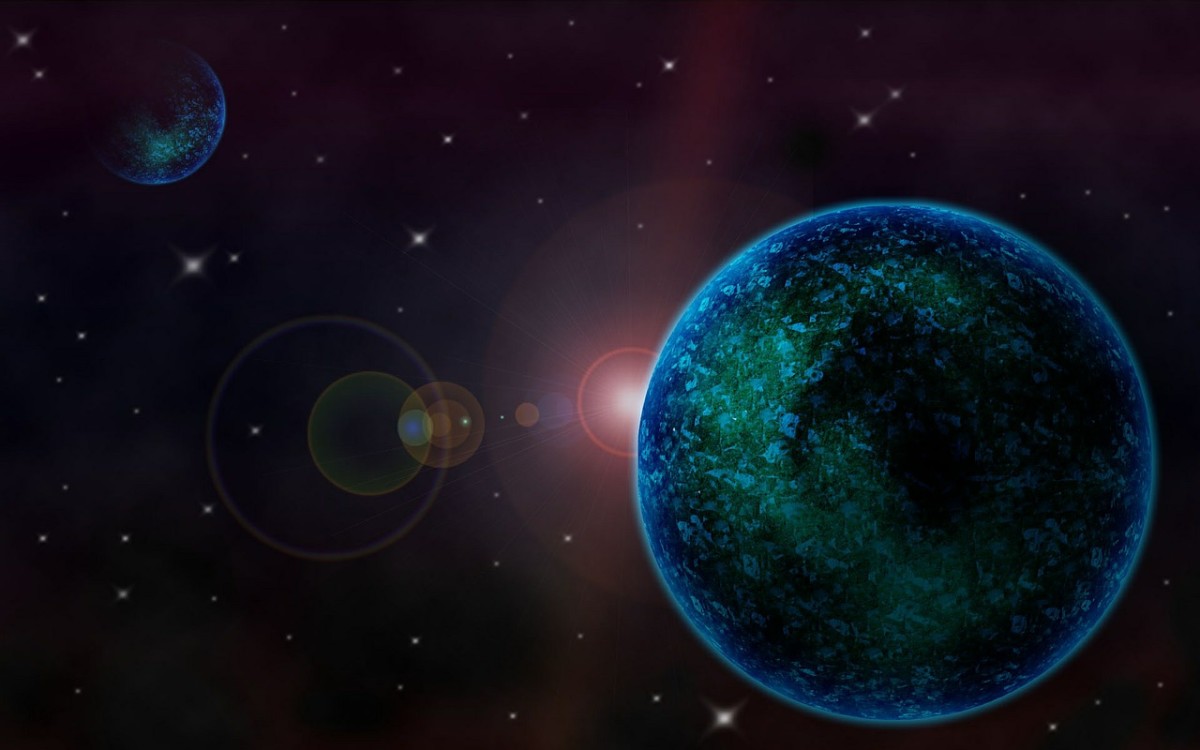Discover the Law of Value


The Roots of the Law of Value
The Law of Value can be applied to every little corner of our economy. When something becomes more expensive, it also becomes less important for instant survival.
The Law of Value has its roots in the animal world. When a male animal is able to show to the other sex that it can afford useless trophies, the female animal assumes an abundance of resources of any kind, which makes the male an attractive mating partner. The male might have good genes for offspring, although this is not measured in an exact way, but indirectly via the abundance in means.
When a man can afford a very expensive diamond, the female sex assumes an assurance of basic needs like food, clothes, housing and a solid future. It wouldn't be logical that a male would waste his last penny on something inedible, since his position wouldn't be sustainable for a long time.
In other words, showing around with useless assets, is an expression of power. An animalistic way to distinguish yourself from others.
Definition of Value
An amount, as of goods, services, or money, considered to be a fair and suitable equivalent for something else; a fair price or return.
Everything is Turned Upside Down

Choose Your Most Valuable Item
The Law of Value
The Law of Value reveals something very odd. That is: The more you really need something, the less it is worth. Doesn't that sounds strange?
The economic Law of Supply and Demand doesn't seem to count at all. That might be so because some necessities like breathable air are beyond the scope of economy.
Well, let's have a look if this is true.
When you look around, you'll notice there are 'things' that you might not pay much attention to, because they are abundantly available, and therefore taken for granted.
Some things, like air, are just there. It costs us barely anything, which creates an illusion of no value. You can pollute the atmoshpere with your exhaust pipe, because it doesn't cost you anything!
The air we breath, the water we drink, the food we eat, the sun we enjoy, the clothes we wear cost us barely anything compared to useless objects like Iphones, diamonds, cars, powerboats and private jets.
Strange, isn't it? True value appears to be inverted to illusionary value. It becomes even stranger, when you see these two different values can be classified under a mathematical law: the value of something to survive is reciprocal to its economical value.
This means that real needs have no economical value at all! Print this in your head.
The more basic, the less expensive. The least expensive things are commonly valued the least as well. Things that cost us nothing aren't valued.
The Economy is Based on the Value Inverter
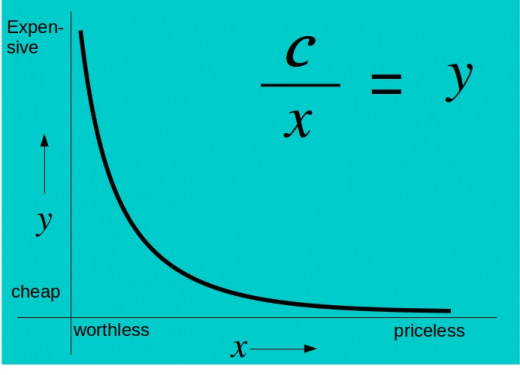
The Paradox of Value
"The paradox of value (also known as the diamond–water paradox) is the apparent contradiction that, although water is on the whole more useful, in terms of survival, than diamonds, diamonds command a higher price in the market. The philosopher Adam Smith is often considered to be the classic presenter of this paradox. Nicolaus Copernicus,[1] John Locke, John Law[2] and others had previously tried to explain the disparity."
--Wikipedia
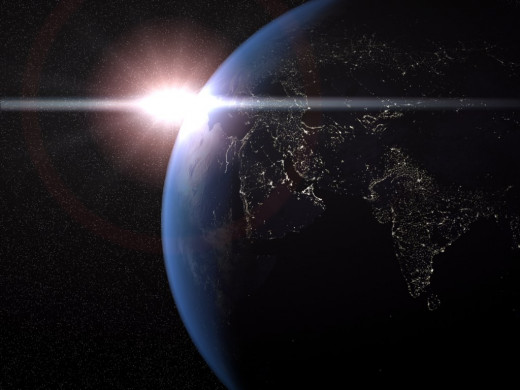
Planet Earth
Without planet Earth we would just survive for about a few seconds. Of course we won't be born in the first place without Earth, but nevertheless, it's an imaginary way to show how much we depend on earth for our instant survival. Earth is therefore priceless.
Homo Sapiens that ought to be an autonomous thinking being, seems to be aware of this fact just a few seconds a year, after which they delve again into their own daily worries.
Earth offers many natural resources that are increasingly exploited in order to keep the economy running like it is, and preferably a few percentages more each year. An economy that isn't growing anymore is the worst doom scenario Homo Sapiens can imagine - recession.
Planet Earth is the largest source of income that is simply there. There's no industry not depending on Earth's resources. Nothing has to be produced, only to be extracted from the soil. The extracted mineral resources are arrogated by just a few monopolies, while it is our common property.
Compare it with someone selling your shoes while you’re still wearing them!
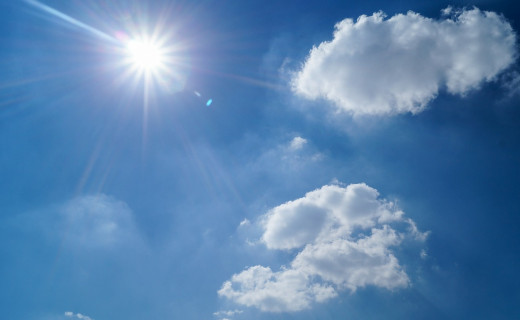
Breathable Air
We can just survive for about 3 minutes without air, which implies that air should be invaluable.
But the strange thing is that we pollute our air with cars, wood stoves, camp fires, air planes and other polluters. This behaviour is similar with animals that pollute their own nest.
We appear to exchange priceless things for almost worthless things. Our drivers to do this is to show how successful we are, which is an expression of an animalistic consciousness. Some behaviour can also be the result of a need for comfort or laziness.
There are changes going on, like cleaner engines in cars, particulate filters in diesel engines and catalysts on the one hand. And air-purifying respirators and cans with fresh air on the other hand. Clean air that used to be free becomes an increasing part of the economy. Would this be coincidental? Or is there an underlying cause and effect?
There are clear patterns that economical assets only move upwards. Cars are getting bigger, computers become faster, people getting fatter, people getting older, the economy becomes complexer, etcetera. This counts also for the 'price' of clean air. The price tag of cleaner air has made lift-off. Clean air has become part of the economy and starts to get a little price tag. This price will grow in the future, and will become one of the most valued products within a few decades.
Clean air won't be free anymore. It's all there, in the math, the constant c changes with time - it appears to be a slow changing variable.
How Long Can You Survive Without?
Item
| Time
| True Value After Inversion
|
|---|---|---|
Earth
| 3 seconds
| Priceless
|
Air
| 3 minutes
| Priceless
|
Water
| 3 days
| Priceless
|
Sleep
| 10 days
| Extremely valuable
|
Food
| 30 days
| Extremely valuable
|
Clothes
| 30 days
| Extremely valuable
|
Sunlight
| 90 days
| Valuable
|
Shelter
| 300 days
| Valuable
|
Iphone
| ∞
| Worthless
|
TV
| ∞
| Worthless
|
Car
| ∞
| Worthless
|
Air plane
| ∞
| Worthless
|
Diamonds
| ∞
| Worthless
|
∞ = infinite
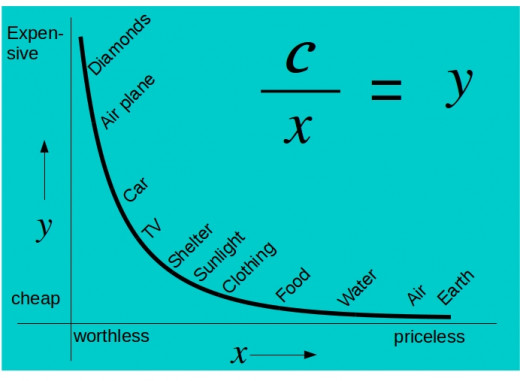
Potable Water
Potable water is the next most valuable thing. We can only survive for about 3 days without potable water. Potable water used to be free everywhere, until we polluted most of the natural sources, and became dependent of mineral water in bottles.
Water is cheap compared to all redundant luxury products. For example 1 gallon of mineral water costs a few dollars. The price tag of an Iphone 6 equals potable water for one person for about three years. Isn't that weird?
When you compare something useless with something absolutely necessary you'll end up with a strange distorted image. The only connection between the two is money (via the value inverter you can determine the true value). Money is besides a way to exchange goods, also a virtual way of measuring value. Everything has a price tag. The only thing you must do, is invert it first before you can determine its true value. That's something that we should teach our children!
In our economy the value of an Iphone is about 350 times more than our own life! How is this measured? Simply by equalling the two things, with as reference the 3 days we can survive without water.
The Balance Point k
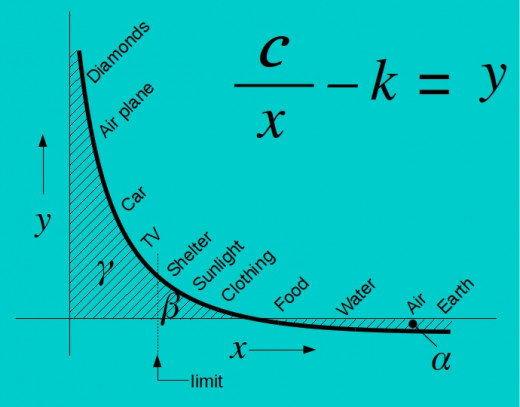
One More Thing: α = β
In the graph above is the constant k introduced in the formula to show the balance between supply and demand. What the earth gives is α, and what we take from earth is β.
To live in harmony with mother nature: α = β. The balance point lies somewhere between shelter and TV.
You see easily what happens to the balance when you add the area γ to it. There arises a huge disbalance between what earth can supply and what we take.
Do you see it? That's it then, folks!
© 2015 by Buildreps

